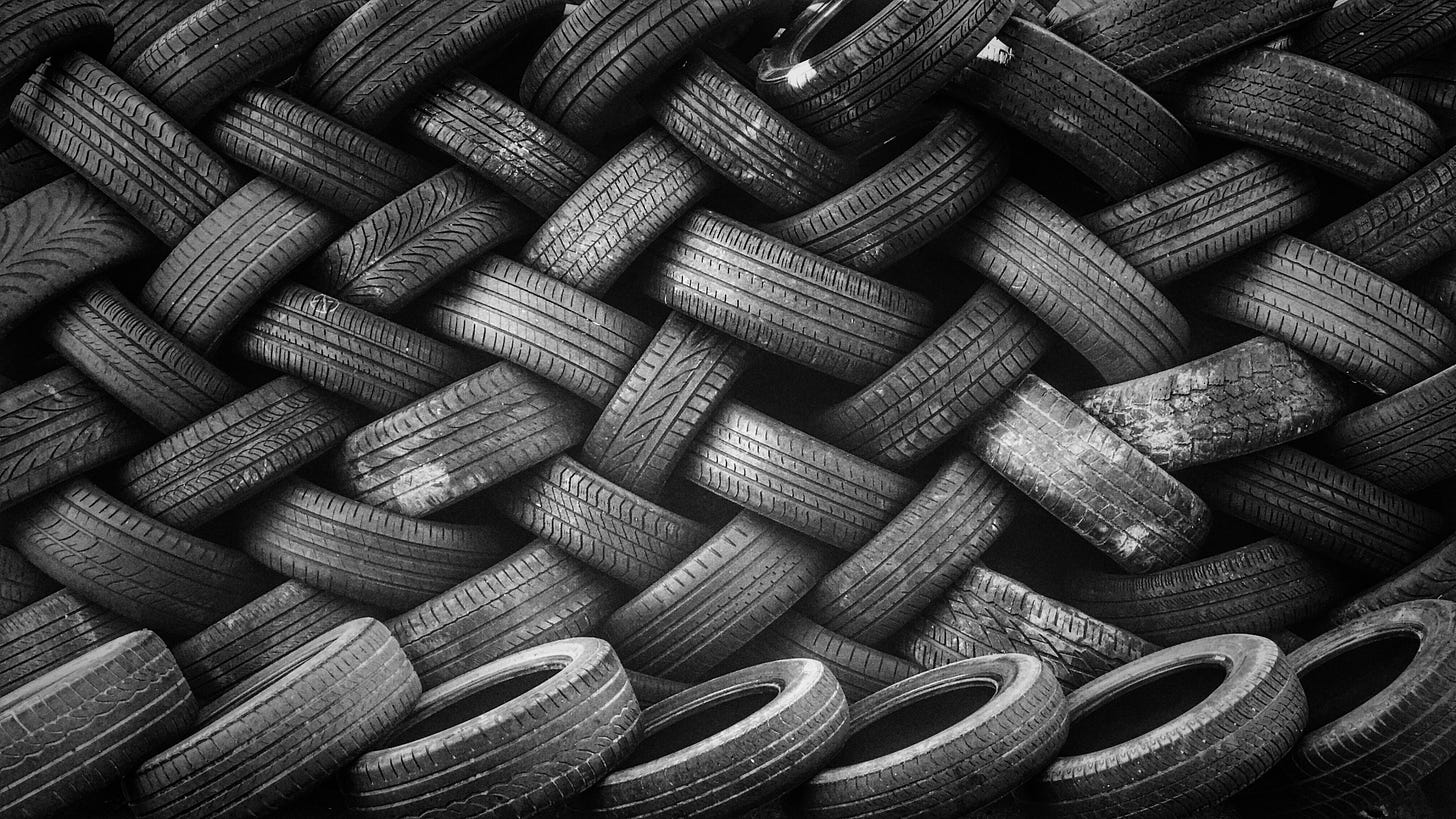Blinkit goes the Amazon way. Sorta.
Also in today’s edition: Wall Street thumbs down ESG; China’s great EV dump; Miami Heat; Kerala vs. antibiotics
Good morning! Banks exploiting regulatory loopholes for better profits is a tale as old as time. The latest addition to the trope is Morgan Stanley, which forged a job title just to avoid scrutiny by the European Central Bank. As per Financial Times, the bank is being sued by a former Frankfurt-based employee who was given the make-believe role of “head of loan trading”. The bank apparently did this to comply with EU regulations on managing European businesses with local staff. Gives major Assistant Regional Manager vibes from The Office.
Soumya Gupta and Adarsh Singh also contributed to today’s edition.
🎧 We deep dive into India’s antibiotic problem. Also in today’s episode: Apple Vision Pro’s early woes. Tune in to The Signal Daily on Spotify, Apple Podcasts, Google Podcasts, Amazon Music or wherever you listen to podcasts.
The Market Signal*
Stocks & Economy: Economies are shrinking the world over. After Japan and the UK slipped into technical recession, Germany’s central bank has warned that the country’s economy will continue to contract in the first quarter. The GDP of Israel, which is locked in a bruising conflict with Hamas, fell nearly 20% in the last quarter of 2023.
Wall Street biggie Goldman Sachs, however, is upbeat about the US market, predicting the S&P 500 will touch the 5,200 mark as the global economy rebounds and the “Magnificent 7” group of tech stocks leads the rally. US equities, however, were a tad subdued on Monday although the S&P 500 held above 5,000. Asian markets were mixed in Tuesday morning trade.
Early GIFT Nifty trends indicate a flat opening for Indian equities, which started the week with strong gains.
E-COMMERCE
Blinkit’s E-Commerce AOVertures
In e-commerce, it’s all about AOV— average order value. And Zomato is using Blinkit to scrounge up a higher AOV. As Zomato’s core food delivery business struggles to expand margins, the company is pushing Blinkit to include more brands and bigger distribution networks.
Blinkit is reportedly in talks to sell more direct-to-consumer brands across new, high-value categories including beauty and electronics. Instead of being a marketplace, Blinkit will procure these goods and sell them. This should help Blinkit increase average order value but will put the quick-commerce platform in direct competition with Amazon.
Scale-up switch-up: For the plan to work, the company needs to expand Blinkit’s distribution network. Since last year, it has been planning to open 100 new ‘dark stores’ (read: small warehouses) by March 2024 to store the inventory it buys for quick-commerce deliveries. Zomato had shut down several warehouses when it acquired the company.
CLIMATE CHANGE
Unmitigated Disappointment
Big Oil had made its stand on climate change mitigation clear at the COP28 in Dubai, when it agreed to cut methane emissions but refused to scale back oil and gas production.
Now Big Capital has drawn the line on how far it is willing to push investee companies on global ESG (environment, sustainability and governance) goals. The investment arms of top Wall Street banks, JPMorgan and State Street Capital Advisors, have left Climate Action 100+(CA100+), a coalition of investors that pushes companies to take climate change mitigation actions. Another company, BlackRock, has reduced its involvement.
Growing numbers: The withdrawals represent $14 billion of capital. There are about 700 members in CA100+, including 60 new ones. Heavyweight asset manager Vanguard never joined the group, while another 13 quit over the years.
On the other hand: The idea of “natural asset companies” to preserve nature is gathering steam.
ELECTRIC VEHICLES
What A Dump!

Pump-and-dump scheme: where promoters hype and artificially inflate owned stock, then sell it at a profit before said stock collapses to pre-pump prices (or worse). Eg: Sadhna Broadcast, crypto shitcoins.
Pump-and-dump trade: where manufacturing superpowers—buoyed by easy credit and subsidies—contend with a new economic reality (read: shrinking domestic consumption) and start dumping excess inventory in other markets. Eg: China.
The second has long been a feature of Beijing’s industrial policy. But the problem is so acute now that the US will not hesitate to “act”. At the eye of the storm is China’s EV overcapacity.
The Signal
Globally, EV demand and investments are cooling, a situation made worse by a nickel glut.
While firefighting its economy, Beijing is also spurring Chinese EV makers—whose supplies now exceed local demand—to expand overseas. This is after the industry resorted to new model launches, price wars, and deep discounts to boost flagging demand within the country. Even the world’s largest EV maker isn’t immune; BYD currently produces four million vehicles a year in China, a million more than the cars it sold in 2023. Little wonder it’s opening/opened plants in Uzbekistan, Thailand, Hungary, Brazil, and Mexico to export to the world.
Meanwhile, NIO is introducing cheaper models despite struggling with debt, staff cuts, and deferred projects.
Overcapacity will strain an already-creaky EV services ecosystem. The Core reported on the many pain points of Indian EV owners, including steep insurance and long wait times for damage repairs. That goes for the BYD ecosystem here too.
TECH
Tropical Miami Gets The Cold Shoulder
It was supposed to be the US' new Silicon Valley. Instead, people are giving Miami a Burn Notice, trashing it with the same fervour Dexter trashed people after chopping them up into chunks. We’ll give Miami its due though: it’s a great setting for TV shows.
Whatchu talkin’ about?: This story in The Wall Street Journal about tech companies and investors returning to the Bay Area after writing it off. During the Covid-19 pandemic, venture capitalist Keith Rabois had urged techies to decamp to Miami and elsewhere as San Francisco struggled with mass layoffs, high cost of living, homelessness, and drug abuse.
But the OG is bouncing back since it’s the epicentre of AI-everything. The result: it’s braving the tech downturn better than emerging hubs. Funding in Bay Area startups contracted by 12% in 2023 compared to 27% in Austin, 42% in Los Angeles, and a whopping 70% in Miami.
HEALTHCARE
Surviving Antibiotics
A senior Indian public health official once remarked that while the world fought disease with clean water and proper hygiene, India relied on antibiotics. That may be changing.
A tiny government-run health centre in Kerala’s Kozhikode became the state’s, perhaps the country’s even, first “antibioticsmart hospital” in November 2023.
What’s that?: It’s a hospital where doctors think twice before prescribing antibiotics. Even when they are unavoidable, the first choice are drugs that are less likely to build resistance. It’s part of a state initiative focussed on reducing antibiotic abuse, including self-medication.
Antimicrobial resistance is a threat to public health globally but India is particularly prone to it because of indiscriminate use of antibiotics.
A Covid revelation: Some may say it was always presumed but now confirmed. Covid vaccines weakened the heart and nervous system slightly, a global study has found.
FYI
Not enough: Farmers have rejected the Indian government’s proposal to buy cotton, corn, and pulses at minimum support prices for five years.
One more try: Zee Entertainment and Sony Group are making a final attempt to see if they can revive their almost-dead deal, The Economic Times reports. The two companies have reportedly held multiple rounds of talks over the past few days.
BFD: Consumer finance giant Capital One, a specialist in lending to subprime consumers, is buying Discover Financial Services in a $35 billion all-stock deal to create the largest credit card company in the US.
Pump up the jam: The Adani Group is in talks with sovereign funds in the Middle East to secure $2.6 billion funding for its airports and green hydrogen projects, Business Standard reports.
Yen yearning: Listed Japanese alcohol and drinks maker Kirin Holdings is reportedly investing $25 million in B9 Beverages, makers of the Indian craft beer Bira91.
Not fair: The Bombay High Court castigated the Central Bureau of Investigation for abusing its power in the 2022 arrest of former ICICI chief Chanda Kochhar and her husband; they are accused in the Videocon loan fraud case.
🔍: The RBI has asked peer-to-peer lending platforms to share data on their internal systems and processes as it investigates these platforms for promising higher or assured returns.
THE DAILY DIGIT
6
Factor by which month-on-month demand for women shop floor apprentices has increased in the past eight months, according to staffing firm TeamLease. (Business Standard)
FWIW
Generation ka-ching: With too much information comes decision fatigue and paralysis. But for Gen Z, it just means opportunities to learn… especially if it’s about the stock market. At least in the US, where Gen Z is increasingly investing in the stock market. Armed with online information, they're opening custodial accounts with their parents. Online stock trading/investing platforms like Schwab have seen custodial accounts rise from 120,000 in 2019 to 300,000 in 2023. A Bank of America survey also corroborated this change; almost two-thirds of Gen Z investors started investing in high school or middle school, compared to 38% of millennials. Politically active, economically astute… what can this generation not do?
Costly AI: Can you hold AI responsible for hallucinating? Don't bother to answer, because a tribunal in Canada has already ruled on it. The tribunal was hearing the case of Jake Moffat, who’d sued Air Canada for reneging on its promise. Mr Moffat claims he was led to believe by the airlines’ AI chatbot that it offered discounts on bereavement flights. The airline, though, has no such policy. After hearing both sides, the tribunal found Air Canada guilty of “negligent representation” and asked it to pay Mr Moffat the discount. Not exactly the way we thought AI was gonna turn on us, but okay.
Wanderlust: Thinking of your next trip? If so, North Korea just opened up for travellers. You can visit Kim Il Sung Square in Pyongyang, listen to a live music performance, or hit the country’s pristine ski slopes. The natural limitations of roaming in a heavily militarised and vigilant state do apply though. You’ll always be supervised by security personnel, no foreign books on the Kim family are allowed, and taking pictures of labourers, farmers, and soldiers is strictly prohibited. Oh, did we mention that you have to be a Russian citizen to get in on the fun? Even so, the Russian rouble won't be of any help; that's because North Korea only accepts the Chinese yuan and US dollar. Plan accordingly. 🙃








